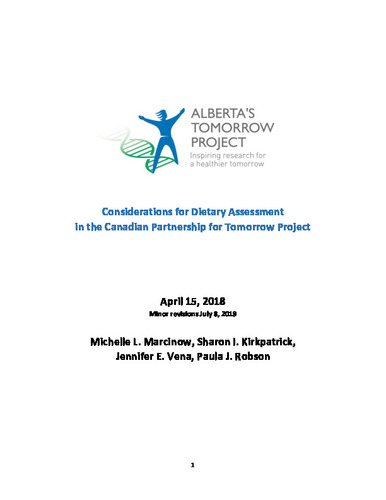| dc.description.abstract | Dietary factors are leading contributors to chronic disease and mortality globally and in Canada (1–3), and have been recognized as modifiable risk factors for certain cancers (4). However, much remains to be learned about how dietary factors interact with other modifiable and nonmodifiable exposures and physiologic variables to influence disease risk in humans (5,6).
Information collected from large prospective cohorts plays an important role in furthering our understanding of diet-disease relationships (7,8). To advance knowledge on how to promote health and prevent disease, it is critically important to use robust tools for collecting dietary information from participants in such cohorts (9). This guide is intended to be utilized by researchers designing nutritional epidemiological research and in particular, to guide the implementation of dietary assessment tools within the CPTP cohorts. The aim is to provide guidance on method selection, data collection, and analyses of dietary data, as well as stimulate discussions of harmonization of methods across cohorts to advance the evidence base. Because objective measures such as biomarkers of diet are currently few, burdensome, costly, and limited in the information they provide about the types of foods and beverages people consume (5,6), researchers typically rely upon self-report tools. However, it has long been recognized that self-reported dietary data are affected by error, including systematic error or bias (9,10), leading some commentators to suggest that research should no longer rely on selfreport approaches (11,12). However, much work has been conducted to better understand and address error in self-report dietary intake data (9,10). Such work has informed the development of novel technology-enabled tools to allow collection of the least-biased data possible, as well as the development of rigorous statistical approaches to mitigate the effects of error (13–16). Based on what is known about sources and types of error in data captured using different types of tools, it has been recommended that a combination of tools may be the optimal way forward for cohort studies. Specifically, multiple 24-hour recalls (24HRs), administered in combination with a food frequency questionnaire (FFQ), may allow researchers to leverage the strengths of each instrument (10,14,17). Data from 24HRs provide comprehensive detail on intake and measure consumption with less bias than FFQs. On the other hand, FFQs measure intake over a longer period (e.g. past month or year) (18–20), meaning they are better able to capture intake
of foods and beverages that may be consumed more episodically (e.g., whole grains, dark-green vegetables) but that may be important to diet-disease relationships. The availability of weband mobile device-based dietary assessment tools for use in Canada and emerging statistical techniques to analyze the resulting data makes this multiple-tool scenario a realistic
consideration for Alberta’s Tomorrow Project (21), other cohorts within the Canadian Partnership for Tomorrow Project (CPTP) (22), and other health-related studies. With comprehensive and standardized measurement of dietary exposures across cohorts, the identification of promising strategies to reduce diet-related disease risk among Canadians can be furthered (9). | en |

